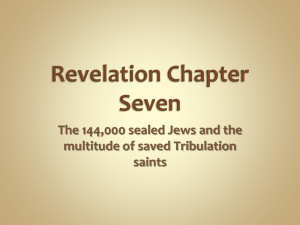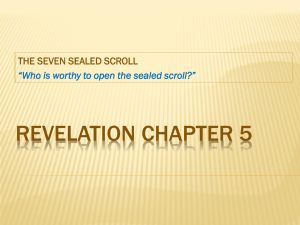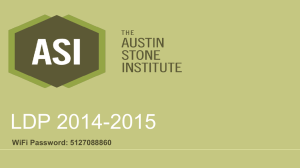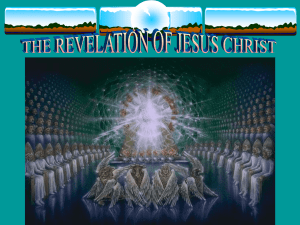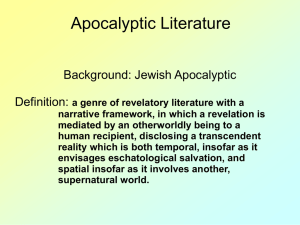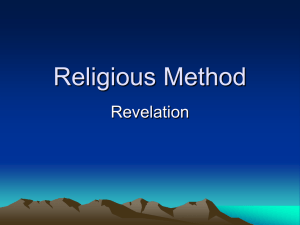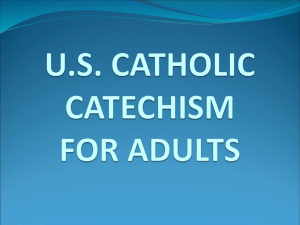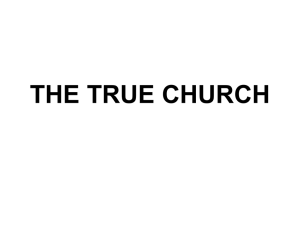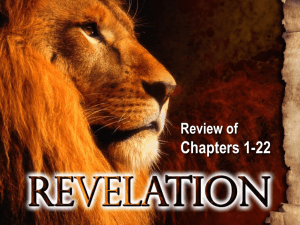(PPT, Unknown)
advertisement
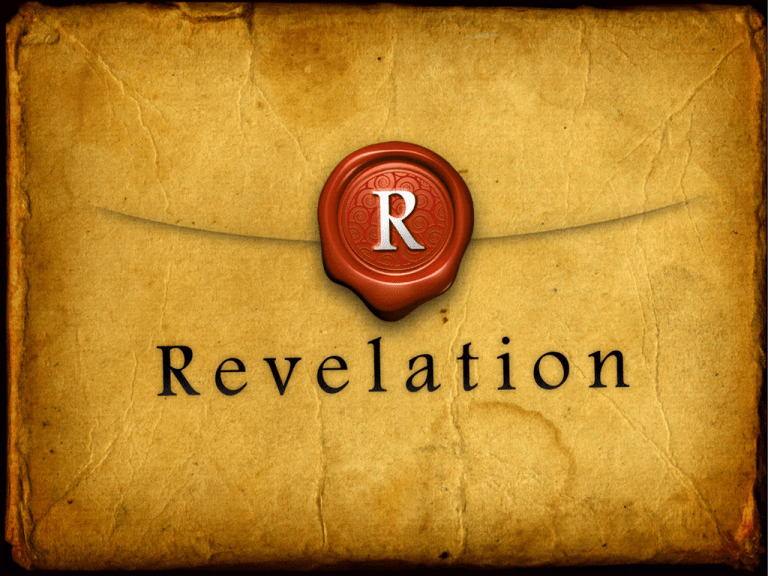
REVELATION 5 Three series with sevens start in this chapter – seven seals, seven trumpets, and seven bowls or vials with the seven last plagues. Seven peals of thunder are mentioned in chapter 10 but not explained. SEALS – 1 2 3 4 5 6 7 TRUMPETS – 1 2 3 4 5 6 7 VIALS – 1 2 3 4 5 6 7 We should compare Revelation with Jesus’ apocalyptic discourses in Matthew 24, Mark 13, and Luke 21 and acknowledge similarities without forcing them to be identical. Revelation 5:1 – The book contains the world’s destiny that is revealed to us pictorially as the seals are broken. Apocalyptic language is often metaphoric, so we need to be careful to discern the literal from the figurative. When figurative language is used, our focus needs to be to understand the truth communicated, not necessarily the figure. Revelation 5:2 – The angel’s voice is loud, penetrating heaven, earth, and the dead under the earth. Revelation 5:3 – No one in heaven or earth or who has ever lived is qualified to open the book. Revelation 5:4 – Perhaps John was depressed realizing that the end could not come unless someone opens the book. Revelation 5:5 – The vision given to John is interactive. Lion from Judah, Genesis 49:9 – The lion is the king of beasts, the monarch of the forest. Thus, it becomes an emblem of one of kingly authority and of power, and as such the appellation is used in this place. The constellation Leo, the fifth sign of the Zodiac, represents Jesus the Messiah. The root of David – This expression connects him directly with David, the great and glorious monarch of Israel, and as having a right to occupy his throne and the authority to open the seals. Isaiah 9:7; 11:1-10; Jeremiah 23:5 and 6; 30:9; 33:15-17; Psalm 132:11-17; Ezekiel 34:23; 37:24 and 25; and Luke 1:32 Revelation 5:6 – The first of 28 times “lamb” occurs in Revelation is the same Greek word,“arnion.” It occurs one other time in the NT, in John 21:15. Another Greek word translated “lamb” is used only four times (in John 1:29, 36; Acts 8:32; 1 Peter 1:19). Jesus as the lamb was the sacrifice necessary for the redemption of humanity and everything in heaven and earth. In Revelation, the fulfillment of the purpose of the ages is recorded by the victory of the slain lamb. Seven horns – The horn is frequently used as a symbol of strength (Deuteronomy 33:17; 1 Kings 22:11; Jeremiah 48:25; Zechariah 1:18; Daniel 7:24) . Deuteronomy 33:17(NASB) 17 “As the firstborn of his ox, majesty is his, And his horns are the horns of the wild ox; With them he will push the peoples, All at once, to the ends of the earth. And those are the ten thousands of Ephraim, And those are the thousands of Manasseh.” Jeremiah 48:25(NASB) 25 The horn of Moab has been cut off and his arm broken,” declares the Lord. The strength of an animal is in the horn, and by this he obtains a victory over other animals. The number seven denotes spiritual perfection and may indicate his complete authority over all the earth since there are seven continents. Seven spirits of God – The seven spirits are in the presence of God (5:4) and are sent into the entire world to see what is going on. The seven continents may be why there are seven spirits, or it may represent the perfection of seeing since seven is the number for spiritual perfection. The seven spirits illustrate God’s omniscience and almightiness delegated to the lamb and show that nothing escapes his sight or power. The different symbols with the tribe of Judah and the line of David show Jesus to be supremely powerful and all knowing and that he has won his victory by his atoning and sacrificial death. Revelation 5:8 – Harps are instruments used for thanking and praising God (Psalms 33:2; 71:22; 81:2; 92:1-8; 108:2-5; 144:9; and 15:3). Psalm 33:2(NASB) 2 Give thanks to the Lord with the lyre; Sing praises to Him with a harp of ten strings. Psalm 71:22(NASB) 22 I will also praise You with a harp, Even Your truth, O my God; To You I will sing praises with the lyre, O Holy One of Israel. Psalm 141(NASB) 1 O Lord, I call upon You; hasten to me! Give ear to my voice when I call to You! 2 May my prayer be counted as incense before You; The lifting up of my hands as the evening offering. 3 Set a guard, O Lord, over my mouth; Keep watch over the door of my lips. “Golden bowls of incense” indicates the precious value of the prayers of the saints and that they are a sweet smell to Yahweh (Psalm 141). Our prayers are ultimately answered, once all the seals are broken. Our prayers are not forgotten ! Revelation 5:9 – New song – Revelation 14:3; Psalms 33:3; 40:3; 96:1; 98:1; 144:9; 149:1; Isaiah 42:10 Psalm 33:2(NASB) 2 Give thanks to the Lord with the lyre; Sing praises to Him with a harp of ten strings. Psalm 81:2(NASB) 2 Raise a song, strike the timbrel, The sweet sounding lyre with the harp. Psalm 144:9(NASB) 9 I will sing a new song to You, O God; Upon a harp of ten strings I will sing praises to You, Revelation 5:9 and 10 – A common and frequent aspect about prophecies in eschatology is many times a broad swooping chronological order is used with only the beginning and end set forth. Here we begin with the lamb slain and are propelled to the saints reigning as kings in the Kingdom of God. Revelation 5:12 and 13 – Again, we are propelled to a time at the very end when everyone in heaven and earth and under the earth praises Yahweh and Jesus (recorded in chapter 20 & 21). Luke 1:31-33 – The beginning of Jesus is stated, then the account catapults to the end. Acts 2:17-21 – The beginning of church (17and 18) is given, and then it is propelled immediately to the end (19-20). Isaiah 1:21-25 – Israel’s immediate future is stated and then is accelerated to the end of the age (26-2:4) 1 Corinthians 15:23 – The resurrection of the just is covered, many events are skipped over, then the account rushes to the end (verse 24) when Jesus will give the Kingdom over to God. Philippians 2:6-11 – This begins with humility and ends with everyone exalting him. Revelation 6:1-11 – The first five seals have already happened or are in the process of happening; ( 12-17) the sixth seal jumps ahead in time to what will happen in the end. Revelation 7:4-8 – This begins before the wrath of God comes, then rushes to the end of the end (9-17). Revelation 12:1-5 – This begins with the Messiah’s birth and rushes to the last 3 ½ years of this age. Chapters 4 and 5 proclaim in vivid and confident terms that the world’s destiny is not under the control of some blind fate. We are all in the hands of a loving Father and of a Savior who died for us. Revelation 5:14 – Amen – They acknowledge the absoluteness of the future plan of God. REVELATION 6 Revelation 6:1 – Seven seals are opened by the lamb between 6:18:1 with an interlude between the sixth and the seventh in 7:1-17. Zechariah 6:1-10 is a loose comparison.

